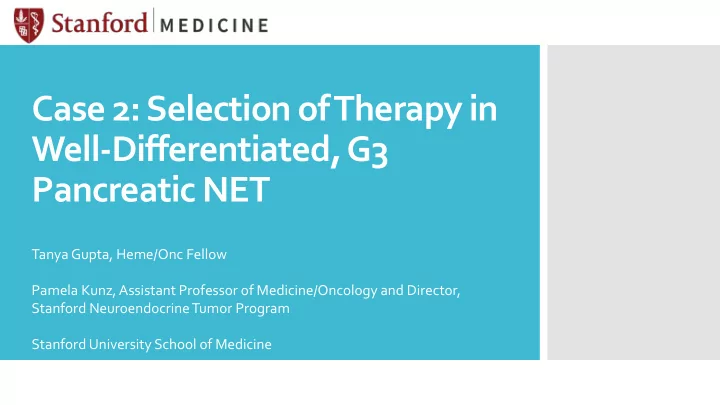

Case 2: Selection of Therapy in Well-Differentiated, G3 Pancreatic NET Tanya Gupta, Heme/Onc Fellow Pamela Kunz, Assistant Professor of Medicine/Oncology and Director, Stanford NeuroendocrineTumor Program Stanford University School of Medicine
Do you treat well-differentiated G3 NETs differently than poorly-differentiated G3 NECs? A) Yes B) No Moderator Question 1
74 yo man presented with 12-14 lb weight loss and abdominal pain. CT CAP: pancreatic tail mass 7.1 x 4.9 x 5.9 cm with diffuse metastases in the liver, metastatic Clinical Course mesenteric and retroperitoneal involvement, periportal/peripancreatic adenopathy, ascites. Liver biopsy show a well-differentiated, grade 3 NET Chromogranin A elevated at 420 (<15 ng/ml)
Pathologic Feature Biopsy Results Morphology Well Differentiated Grade 3 Stains + synaptophysin, + chromogranin Clinical Course Pancreatic Mitotic 0/10 HPF Index Pancreatic Ki67 28% Liver Mitotic Index 2/10 HPF Liver Ki67 34%
68 Ga-DOTATATE PETCT at diagnosis Contrast CT A/P at diagnosis
Past Medical History Family History BCC Mother: ovarian cancer BPH Sister: breast cancer Maternal grandmother: pancreatic Medications adenocarcinoma Clinical Course Multivitamin Ambry Genetics germline Pantoprazole testing with no pathogenetic variants for Tamsulosin patient
Which of the following is the best 1 st line treatment option? A) Platinum / etoposide B) Temozolomide / Capecitabine Audience C) Everolimus Response D) 177 Lu-Dotatate (PRRT) Question 1 E) Immunotherapy
Which of the following is the best 1 st line treatment option? A) Platinum / etoposide B) Temozolomide / Capecitabine Audience C) Everolimus Response D) 177 Lu-Dotatate (PRRT) Question 1 E) Immunotherapy
The patient received carboplatin/etoposide as 1st line therapy. Imaging initially showed tumor shrinkage. However, after 8 cycles, the patient developed increasing fatigue, imaging showed a mixed Clinical Course response and chromogranin rose from 3910 to 6232 in one month.
Which of the following is the best 2 nd line treatment option? A) Add immunotherapy to platinum/etoposide B) Temozolomide / Capecitabine Audience C) Everolimus Response D) 177 Lu-Dotatate (PRRT) Question 2 E) Single agent immunotherapy
Which of the following is the best 2 nd line treatment option? A) Add immunotherapy to platinum/etoposide B) Temozolomide / Capecitabine Audience C) Everolimus Response D) 177 Lu-Dotatate (PRRT) Question 2 E) Single agent immunotherapy
As a 2 nd line treatment, the patient received temozolomide/capecitabine. Imaging showed hepatic progression after 3 mo. Clinical Course Contrast CT A/P before Tem /Cape Contrast CT A/P after 3 mosTem /Cape
The NET Tumor Board recommended systemic treatment. Liver disease burden was too high for successful chemoembolization. As 3 rd line treatment the patient received capecitabine/oxaliplatin. Imaging initially showed excellent tumor Clinical Course shrinkage. After 11 cycles, imaging showed progression in liver and peritoneum. As 4 th -line treatment the patient received 177 Lu Dotatate.
After 2 cycles a 68 Ga DOTATATE PET showed new liver and peritoneal metastases and increased size of the pancreatic mass. Clinical Course DOTATATE PET before 177 Lu Dotatate DOTATATE PET after 2 cycles 177 Lu Dotatate Images courtesy of Dr. Ben Franc, Stanford
The patient was asymptomatic and this was interpreted as possible pseudo-progression. 177 Lu Dotatate was resumed and early interval imaging was scheduled. 1 month after treatment #3 a CT Abdomen showed increasing size of the pancreatic mass Clinical Course and hepatic/peritoneal metastatic disease. PR As 5 th line treatment carboplatin/etoposide was re-started.
Do you treat well-differentiated G3 NETs differently than poorly-differentiated G3 NECs? A) Yes B) No Moderator Question 1
Recommend
More recommend